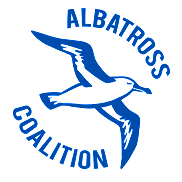The Save the Albatross Coalition (SAC) is a bootstrap campaign dedicated to stopping the tide of single-use disposal items polluting our oceans and killing our wildlife – in particular the iconic Pacific Albatross.
Our current focus is on plastic bottles and bottle caps, which combined are the most frequent items found at beach and watershed clean-ups. 2017 has been a productive year:
- We initiated California Assembly Bill 319 – thank you author Assembly Member Mark Stone, which will prohibit retailers, by 2020, from selling beverages in bottles with a cap not tethered to the container.
- To garner support for the bill, we created the Leash the Lid Toolkit. Please use it to distribute information, write legislative letters of support and letters to the editor, ask your city council or mayor to pass a resolution. Also, please share the Leash the Lid – Support AB-319 YouTube video and the Tell Coke and Pepsi to Leash their Lids!org petition. We have almost 92,000 signatures so far!
- We are in dialog with Coca-Cola, PepsiCo and Nestlé Waters on these efforts.
- To help pay lobbying and website expenses, we created a dynamic Indiegogo Campaign. Please check it out!
# # #
Paula White, The Watershed Project, 9/15/15
Decades of data from Coastal Cleanup Day show that plastic bottle caps are the 4th most prevalent item found at cleanups. In the last 26 years, 1,044,414 plastic bottle caps have been collected and recorded. Those that don’t get picked up by volunteers join the plastic soup in the ocean where they are then ingested by many animals, notably the impressive seabird, the Albatross.
It’s time to leash the lid! In the 1970s the pull-tab or “pop top” on aluminum cans was replaced by the much safer and environmentally friendlier “sta-tab”, and is still in use today. We did it then, we can do it again. Read more… The Watershed Project.
Campaigns
GRRN/Zero Waste USA
Albatross Coalition – Protecting Our Ocean – Zero Waste USA is launching a campaign to raise awareness about the impacts of landbased trash on the ocean. We will partner with Cordell Banks NMS to create a focused campus stewardship project that builds on the Winged Ambassors curriculum. The new project uses the Litterati platform to track litter identified through a campus debris survey. Students will be guided to take action through service-learning activities to reduce debris on campus and create change in their communities. More soon! Read more: Plastic Poses a Growing Threat to Seabirds, Study Says, 9/1/15 and Proceedings of the National Academy of Sciences – Threat Of Plastic Pollution To Seabirds Is Global, Pervasive and Increasing 1/31/15
Zero Waste Brain Trust (ZWBT) – is an informal coalition of resource management professionals and others committed to the transition to a world without waste. We are focused on the development of systems that work well for all stakeholders – residents, businesses, service providers, workers, neighbors, jurisdictions and regulators. Intent on collecting and cultivating game-changing concepts, we are also keenly interested in key strategies and incentives that benefit all stakeholders. All are welcome to take part!
Like many ideas, the inspiration for this kind of campaign was independently conceived by numerous people. The ZWBT effort was conceived in 2009 by Portia Sinnott of Zero Waste Sonoma County with help from Kevin Drew and Ruth Abbe. The ZWBT Core Team – led by Portia Sinnott, includes Ruth Abbe, Gary Liss and Rick Anthony with input from Tedd Ward, Lynn Pledger and John Davis. Five ZWBT brainstorms were held from 2010-2012. Sponsors included Zero Waste Sonoma County, Northern California Recycling Association, San Francisco Department of the Environment, Global Recycling Council of the California Resource Recovery Association and Zero Waste USA/GrassRoots Recycling Network. Also assisted by a 2010-11 research grant from the Altamont Educational Advisory Board.
Defending the Zero Waste Brand – The good news is that most solid waste and recycling leaders around the world are now embracing the concept of Zero Waste. The bad news is that we don’t all agree on what that means. The Zero Waste International Alliance was established in 2002 to develop worldwide standards to guide the development of the new Zero Waste system. In 2004, ZWIA adopted the first definition of Zero Waste in the world that was peer reviewed by leaders of the recycling, Zero Waste and environmental movements. In 2005, ZWIA adopted Zero Waste Business Principles. In 2009, ZWIA adopted Global Zero Waste Community Principles, including a revision of the definition of Zero Waste. In 2013 and 2014, ZWIA adopted the Zero Waste Hierarchy of Highest and Best Use. The combination of these policies is the Zero Waste Brand embraced by worldwide leaders of the recycling, Zero Waste and environmental movements.
Zero Landfill is not Zero Waste – Terms like Zero Waste to Landfill and Zero Landfill suggest that a lot of materials might be burned in an incinerator – that is not real Zero Waste and needs to be called out as something different. Any place burning more than 10% of their materials in any type of “thermal processing system” is not Zero Waste. Read more: Zero Landfill is not Zero Waste, Eric Lombardi, Biocyle, 7/2011 (pdf)
Compostable Organics Out of Landfills – While we work toward longer-term, challenging solutions like shutting down coal-fired power plants and taking cars off the road, the easiest, first step that can produce significant climate results RIGHT NOW is to STOP landfill-produced methane. Simply by getting COOL — Compostable Organics Out of Landfills — we can prevent potent methane emissions AND build healthier soils. Taking the COOL step replenishes carbon stocks and supports sustainable agriculture, yielding healthier foods for our population. The technology exists, the need is certain and the time to act is NOW. Read more: Compostable Organics Out of Landfills (COOL) (website – needs updating)
